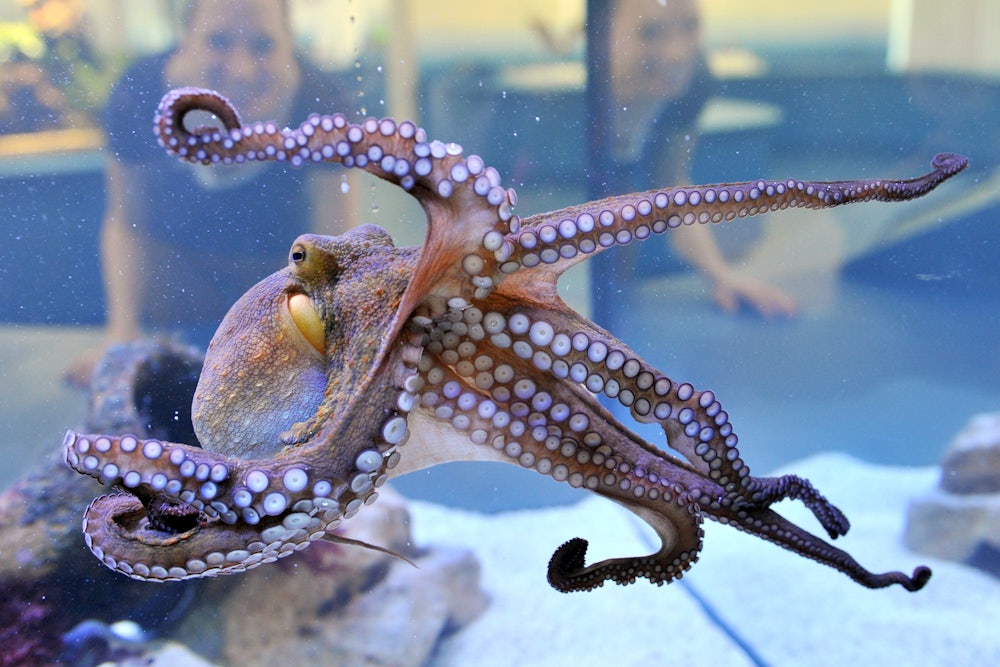

| Online: | |
| Visits: | |
| Stories: |
Octopuses Can Edit Their Own Brain Genes, Study Finds

Octopuses have a good change of being among the world’s most interesting creatures, and newly published research adds weird evolutionary habits to their noteworthy features.
Evolutionary changes that benefit an organism tend to occur at the start of the molecular production process, with mutations in DNA being transcribed into RNA before being translated into an altered protein.
For cephalopods, however, this is not the case. (We should mention that there are of course other cephalopods and not only octopuses – squid for example. They’re interesting too. In a tasty sort of way).
In cephalopods, proteins can be altered without there previously having been any alteration of the basic sequence of the DNA blueprint.
The study, published in the journal Cell, also hints that squid and octopuses may be of greater evolutionary age than previously believed.
Unusually stable DNA
The unusual process of changing proteins without changing DNA is referred to by the researchers as ‘RNA editing’.
Scientific American explains that: RNA editing…involves enzymes swapping out one RNA base (or nitrogen-based “letter” in the RNA/DNA alphabet) for another, presumably in the interest of an organism adapting to its environment.”
Such editing is found in other creatures, including humans, however, it is very rare. Only a few dozen sites among some 20,000 genes in humans can be identified as doing something like this.
In cephalopods, though, the process is very common and is used in part to respond to changes in the temperature of the ocean.
Squid have roughly the same number of genes as humans, yet more than half undergo RNA editing. The editing happens particularly in the nervous system of a cephalopod, including in gene coding for ion channels that assist in electrical communication between neurons.
The fact that cephalopods can adapt where necessary without involving DNA has meant that over the period of their evolution, their DNA has been left much more intact and close to the original than in other animals, which show evidence of millions of years’ worth of DNA mutations.
Paper co-author Joshua Rosenthal, a cephalopod neurobiologist at the Marine Biological Laboratory, explained that in order for RNA editing to do what it does, the DNA coding would have to remain stable over thousands of years.
If a creature needs RNA editing to survive, then any DNA mutations that interfered with that process would likely not survive into subsequent generations.
“If a squid and octopus want to edit a base, they must preserve the underlying RNA structure,” Rosenthal said.
“This means that the RNA structure can’t evolve. If it collects mutations as a result of DNA mutations, it would no longer be recognized by the editing enzymes. We normally think of mutations as the currency of evolution. But in this case their accumulation is suppressed.”
The oldest creatures in the world?
Why cephalopods use so much RNA editing is unclear, however, it’s posited that in one way or another it is done for speed.
Either to adapt to changing environments without waiting for slower mutations to catch up, or simply because cephalopods live fairly short lives, only breeding once, in which they have to get things done quickly.
Clifton Ragsdale, a University of Chicago neurobiologist who noticed high levels of editing in cephalopods during a 2015 study, suggests that: “This may explain why they’re such good problem solvers. No one’s around to show them how to figure out the world!
“How to make their dens. How to camouflage themselves and attack prey. They’re on their own, and fortunately for them, they have big brains and can sort matters out.”
Future research will hopefully look at what outside influences prompt RNA editing.
Rosenthal said: “We want to see which environmental variables influence the RNA editing process—things like variation in temperature…maybe something more complex like experiences.”
A change in thinking about the age of cephalopods resulted from the study because animals’ aging is usually ascertained by studying mutations in DNA. However, if RNA edits were doing a lot of the work for cephalopods, this could mean that observable mutations in their DNA actually took place over a longer time than first appeared.
“The Nobel Prize–winning biologist Sydney Brenner once said that octopi were the first intelligent beings on Earth,” Ragsdale pointed out. “This could prove he was right.”
—–
Image credit: Thinkstock
The post Octopuses can edit their own brain genes, study finds appeared first on Redorbit.
redOrbit.com – offers Science, Space, Technology, Health news, videos, images and reference information. For the latest science news, space news, technology news, health news visit redOrbit.com frequently. Learn something new every day.”
Source: http://www.redorbit.com/news/science/1113417871/octopuses-can-edit-their-own-brain-genes-study-finds/





THE PLURAL FOR OCTOPUS IS OCTOPI